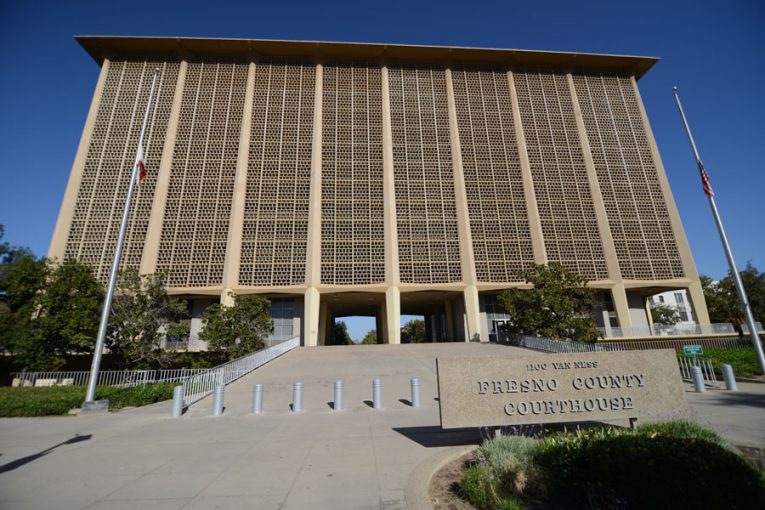
 By Ankita Joshi
By Ankita Joshi
FRESNO, CA – Defendant Dillon Troy Domenici appeared in Fresno County Superior Court this week on domestic violence charges for a sentencing hearing—it didn’t turn out as advertised for Domenici.
He had accepted a plea deal for time served after two days in custody. However, Judge Francine Zepeda refused to follow his plea deal after reviewing the facts of his case.
Judge Zepeda made it very clear to both the district attorney’s office and Defense Attorney Jerry Lowe that she rarely followed these types of plea deals on domestic violence charges.
Once Lowe had introduced the plea deal that had been offered, and accepted by Domenici, Judge Zepeda immediately stated that she would require Domenici to serve a minimum of 90 days in the Adult Offender Work Program (AOWP). 
And, while Deputy District Attorney Adam Christopherson stated that the offer was made to Domenici due to evidentiary issues, Judge Zepeda was adamant in her decision not to follow through with the plea deal.
“There are rarely DV cases where I think two days is sufficient… if someone gets hit, even if there are evidentiary issues, I reserve the right, and it is my job to decide. I am not going to follow that plea,” she stated.
At this point, Lowe decided to take a moment to discuss the next steps with Domenici.
During this brief break, Judge Zepeda addressed DDA Christopherson and stressed, “I frequently do not follow cases where the DA offers, unless it requires it. But he did actually touch her, there are different things. There was enough for him to enter a mis-plea.”
Once the break was over, defending attorney Lowe decided to continue with the sentencing hearing after Judge Zepeda told him that she would not let him speak to the court, but rather talk on record.
Judge Zepeda then asked Lowe to present all the factors why Domenici should be sentenced to a lower amount of AOWP days. She stated that the range she is considering is between 0 to 90 days.
Before Lowe began, however, Judge Zepeda brought up the common factor of alcohol that was present in the current case, as well as Domenici’s previous convictions.
Lowe took this as an opportunity to begin listing all the relevant factors to consider in Domenici’s sentencing.
To begin, Lowe stated, “I’ve known him since 16 when he violated a traffic stop. I have seen him grow up, and really, in particular within the last year, especially relating to alcohol.”
Both the victim and the defendant in this case had admitted to alcoholism, and are both taking the steps to try and get better, he said, and apparently, while it was not required by the court, Domenici has voluntarily gone to AA meetings twice a week since September of last year, and maintained his sobriety.
As Lowe was going over the steps taken by Domenici with his AA program, he also mentioned that he thinks “it’s important to mention that he’s been giving a lot of donations to the Marjorie Mason Center because he wants to live amends. It’s part of the 12 steps.”
Judge Zepeda voiced her approval of Domenici’s actions and stated that these steps taken by Domenici were important to her.
Lowe continued by including that Domenici had been asked to read and write a book report about what he had learned on a book about domestic violence. Domenici is also self-employed in agriculture, and has a stable full-time job there.
In terms of the completion of domestic violence classes, Domenici had completed 48. And it was mentioned that at a previous hearing Judge Zepeda had noted, with the exception of one other person, Domenici was the only defendant she had witnessed receive all exceptional remarks.
Additionally, Domenici also had a peaceful contact order with the victim in this case.
Lowe concluded listing all the factors to consider for Domenici’s sentencing, including “for at least three or four months [Domenici] was paying out of his own pocket to be tested for drugs and alcohol to hold himself accountable.”
Deputy Probation Officer Keri Calles, however, brought up that, while Domenici had achieved many positive accomplishments during his path to recovery, he had failed to contact the Probation Department for his Risk Protection Order (RPO) interview.
Judge Zepeda also brought up possible restitution that the defendant might have to pay since there was a broken windshield involved in the incident. However, it was noted the windshield had been on Domenici’s own vehicle, not the victim’s, and Domenici had already repaired it.
At this, Judge Zepeda entered the sentence of 30 days of AOWP, which would have to be completed over the span of three years.
Lowe asked the court to consider lowering the number of days to 20 for Domenici’s busy work schedule, and also because Domenici was eligible to reduce his charges to a misdemeanor after a year.
Judge Zepeda agreed that if Domenici completed the AOWP days within a year, she could concede to lowering the number of days served to 26, two of which Domenici had already served. This way, Domenici would only have to do two days a month.
After considering all the factors presented by the defense, the final sentence given to Domenici was three years of formal probation, a commitment to AOWP for 26 days, a reduction of fines to $300, and the completion of the Batterer’s Prevention Program.
 Ankita Joshi is a second-year student at the University of San Francisco, pursuing a major in International Studies and a minor in Political Science. She is originally from Sacramento, CA.
Ankita Joshi is a second-year student at the University of San Francisco, pursuing a major in International Studies and a minor in Political Science. She is originally from Sacramento, CA.
To sign up for our new newsletter – Everyday Injustice – https://tinyurl.com/yyultcf9
Support our work – to become a sustaining at $5 – $10- $25 per month hit the link: